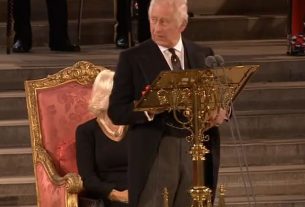After a chaotic afternoon at the Labour Party conference yesterday, Jeremy Corbyn’s Brexit stance secured the backing of his party. Members voted against a motion which would have seen Labour unequivocally back Remain in a second Brexit referendum.
Corbyn’s policy is to negotiate a new, improved Brexit deal with Brussels before offering it to the people in a second referendum in which he would remain studiously neutral. Following a Labour victory in a general election, a special party conference would be held to determine Labour’s precise position in that referendum.
Chaos surrounded the voting process in the conference hall. The rebel composite motion which demanded unequivocal support for Remain was a close call: the Chair Wendy Nichols announced that the vote had been carried, and then that it had not, before saying that Jennie Formby, who was sitting right next to her, thought that it had in fact been carried. The verdict ultimately emerged that the motion had not passed.
The decision comes as a re-affirmation of support for Corbyn at a time when his policy of ‘constructive ambiguity’ had looked under attack from within the party. The motion for Remain had been supported by Unison, the country’s largest trade union and a powerful force in the Labour Party; grassroots activists had been calling for Labour to argue ‘energetically’ for continued EU membership in a second referendum; and a growing consensus among senior Labour MPs has begun to crystallise around a clear Remain position.
The divisive vote comes after a troubled few days for the Labour Party. Saturday saw the failure of a surprise motion brought by Jon Lansman, the founder of Momentum, to remove the position of Deputy Leader and thus oust Tom Watson. Last week there was a resignation from Andrew Fisher, a senior aide to Corbyn who wrote the 2017 Labour manifesto: a memo from Fisher condemned a “lack of professionalism, competence and human decency” in Corbyn’s team.
The in-fighting over Labour’s Brexit position has served to distract attention from a number of radical policies that have emerged at the conference. Yesterday John McDonnell announced plans for a 32-hour working week to be achieved within a decade, which he claims will not affect salaries; he made the case for the full restoration of trade union rights; and the day before, the conference had approved a motion effectively to abolish private schools and to redistribute their assets ‘democratically and fairly’ across the state sector.
The focus on Labour’s Brexit policy has also left them unable to capitalise politically on what could in less tumultuous times have been a major scandal. The Sunday Times has claimed that, as mayor of London, Boris Johnson disregarded official advice and gave a close friend of his, Jennifer Arcuri, access to trade missions and more than £100,000 of public funds for her businesses.




